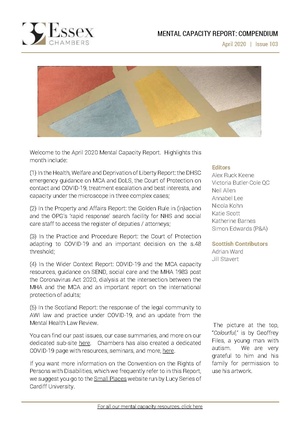| Display title | Sunderland City Council v AS [2020] EWCOP 13 |
| Default sort key | Sunderland City Council v AS (2020) EWCOP 13 |
| Page length (in bytes) | 1,210 |
| Page ID | 10840 |
| Page content language | en - English |
| Page content model | wikitext |
| Indexing by robots | Allowed |
| Number of redirects to this page | 0 |
| Counted as a content page | Yes |
| Page image |  |
| Edit | Allow only users with "editing" permission (infinite) |
| Move | Allow only users with "editing" permission (infinite) |
| Page creator | Jonathan (talk | contribs) |
| Date of page creation | 16:47, 7 July 2020 |
| Latest editor | Jonathan (talk | contribs) |
| Date of latest edit | 11:54, 8 October 2021 |
| Total number of edits | 4 |
| Total number of distinct authors | 1 |
| Recent number of edits (within past 90 days) | 0 |
| Recent number of distinct authors | 0 |
Description | Content |
Article description: (description)
This attribute controls the content of the description and og:description elements. | (1) The court decided that a CTO patient lacked capacity in all relevant areas (litigation, residence, care and contact). When giving oral evidence the jointly-instructed psychologist changed her mind on: litigation capacity (initially she thought AS had litigation capacity while not having subject matter capacity), residence (she placed insufficient weight on 'structure and routine', which is an integral part of the information relevant to a decision on residence in supported as opposed to independent living), and fluctuating capacity. The judge noted with approval the approach in NICE guidance on "Decision-making and mental capacity" to people with executive dysfunction. (2) The court authorised the deprivation of liberty (there was a high level of supervision throughout the day and night, in the accommodation and community). |
